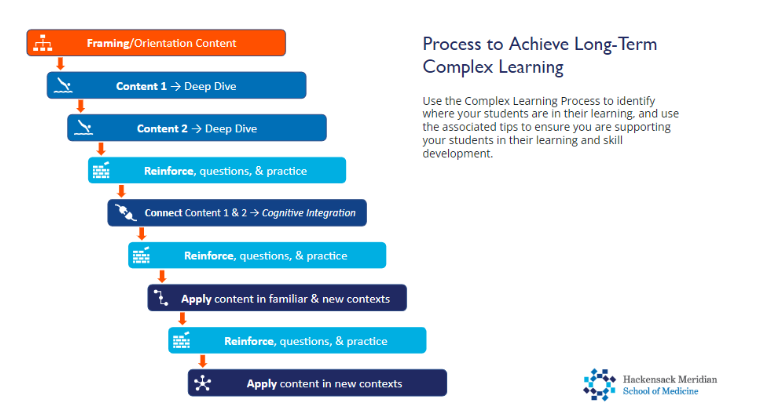Active Learning Strategies
COMPLEX LEARNING
Medical school requires complex learning. This means that students need to learn many layers of skills, knowledge, behaviors and attitudes, and they need to integrate and use these all at the same time. Complex Learning, in our curriculum is an approach, a strategy and process for life-long learning, and learning how to use the appropriate learning strategies at the appropriate time that are most effective for the type of learning. For students, this requires metacognition of the learning and awareness of utilizing the appropriate resources, and creating growth goals to help achieve the learning outcomes. For faculty, Complex Learning is a strategy for aligning the teaching with the appropriate resources, pedagogies and methods in order to help students be most effective and successful in their learning.
The Complex Learning Process includes:
- Integration of knowledge, skills, and attitudes
- Coordinating qualitatively different (constituent) parts
- Transferring what is learned to new/novel problems
- Transferring what is learned in the classroom to the clinical/real world setting
Complex Learning Resource Framework:

It is critical that you as the faculty are aware of where students are in the complex learning process at any given point. For example, you do not want to do a deep dive into a content area if students have not already learned the framing and foundational content for that area.
Learning strategies and learning methods are used to advance the learning.
- Careful consideration of the selection of a learning strategy or method can make the learning more effective. Whereas, not considering the most appropriate learning method, may hinder or slow learning down.
- Learning methods are developed using the needs assessment, the goals and objectives of the course, the learning environment and the learner needs.
- Include online learning, synchronous and asynchronous, self-directed learning and active learning., when considering learning pedagogies and methods.
To hear more about Complex Learning for faculty, click here.
